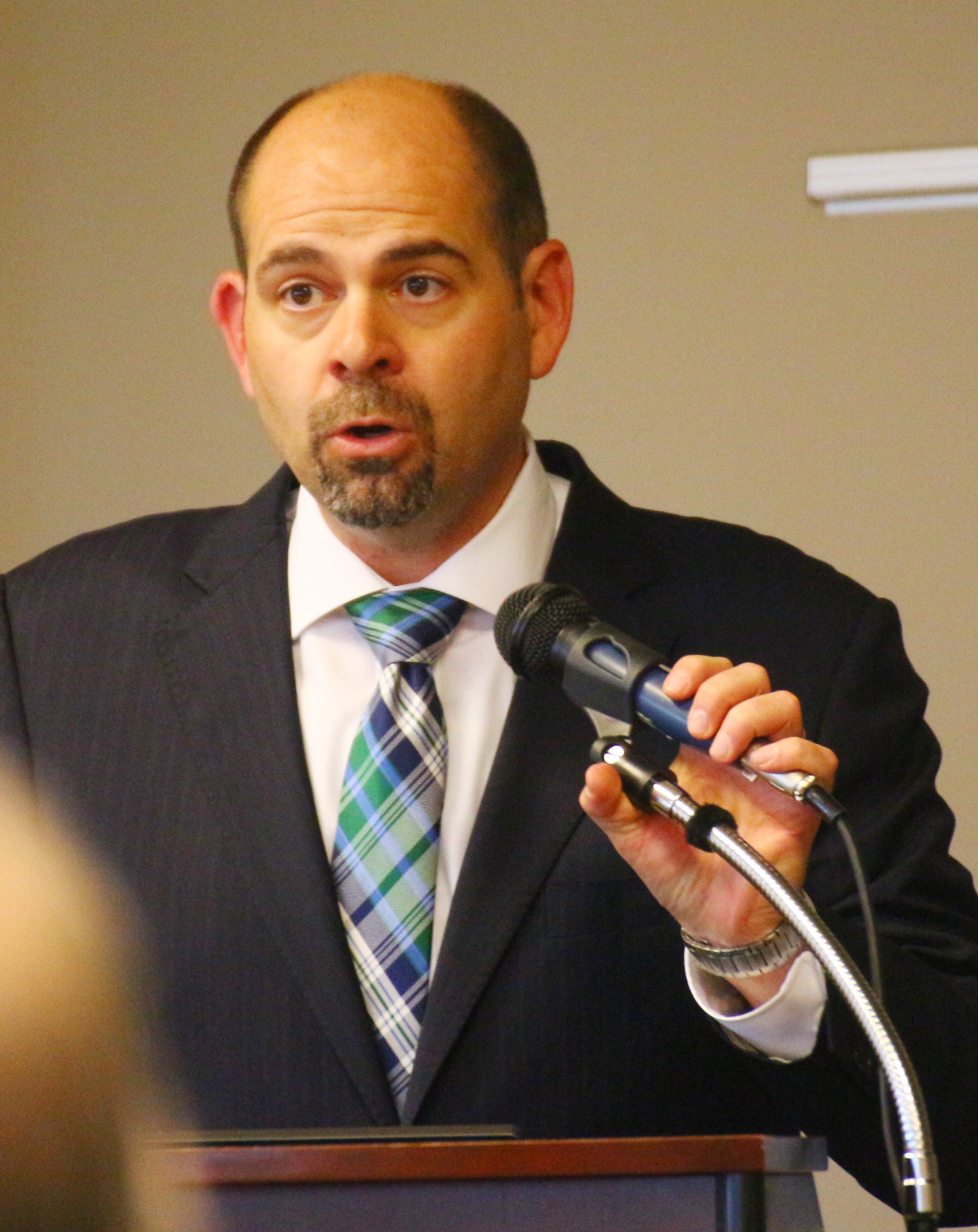Industrial foundation’s role would be reduced under EDP reorganization plan
Published 8:12 am Tuesday, April 25, 2017

- Ben Kleppinger/ben.kleppinger@amnews.com Kyle Talente with RKG and Associates speaks with elected leaders and members of the public during a meeting to discuss his strategic economic development plan Thursday night.
The Boyle County Industrial Foundation would play a “much more passive role in economic development” under a restructuring plan for the Economic Development Partnership proposed by consultant Kyle Talente.
“If you look at my structure, the industrial foundation by far has taken the largest leap toward the middle to create this partnership and help it continue to grow and thrive,” Talente said during a discussion of his plan with elected officials and members of the public last week.
Talente’s plan calls for the removal of four agencies currently under the umbrella of the Danville-Boyle County Economic Development Partnership and the creation of a renamed group called the “Danville Boyle Development Corporation.”
The “DBDC” board would have 18-20 voting members, including six members appointed by the industrial foundation.
“There’s a lot of unnecessary confusion about how economic development decisions are made in your community,” Talente said during the meeting. “The reality is there’s a simple fix: You have an economic development entity; the administration and implementation of that should (come from) the economic development entity. … So let’s do that. Let’s try and organize and say, ‘OK, all our employees are employed by this organization and all decisions are made by this board.”
Currently, the industrial foundation provides around $127,000 annually for the EDP’s budget, including $82,000 that covers the majority of the salary and benefits for EDP President and CEO Jody Lassiter.
The only entity that provides more funding in the EDP’s total budget is the City of Danville, which contributes $145,000 per year. However, officials have previously said a large portion of the city’s contribution is pass-through funding for the Heart of Danville.
Lassiter currently serves as the president and CEO for both the EDP and the industrial foundation. That would change under Talente’s plan.
The industrial foundation would “be a contributor, no different than the city and the county and the Chairman’s Circles (private business donors),” Talente said.
“He (Lassiter) wouldn’t necessarily work for them (the industrial foundation) like he does now?” Danville City Commissioner Denise Terry asked.
“The CEO of this economic development organization I propose would be 100-percent employed by the economic development organization,” Talente responded.
Boyle County Magistrate John Caywood asked Talente what he saw as the mission of the industrial foundation under the reorganization.
“The industrial foundation owns property, they have financial resources. They are managing their resources and they are managing their assets and they fund economic development no different than what the city and county do with their resources,” Talente said.
“If my memory is right, then that’s a lesser mission than what they’ve had,” Caywood said. “Is that correct?”
“That is a substantially different role — a much more passive role in economic development than they’ve ever had,” Talente responded. “It’s a substantial change … from the industrial foundation’s perspective, they have been supportive of this new role.”
“John (Albright, industrial foundation chairman), I don’t want to put words in your mouth,” Talente continued. “I know you’re sitting in the crowd. But that’s been my take on how this has gone down.”
“Yes, you’re correct,” Albright said.
Later in the meeting, Caywood asked about the six seats the industrial foundation would have on the new board — more seats than any other single entity would hold.
“Someone is going to ask me, ‘why do they get the number of seats at the table when they have a lesser mission?’” Caywood asked.
“I think we’re mixing up mission with investment,” Talente said. “… They get that many seats because right now, they are the largest investor in economic development in Danville-Boyle County.”
Talente said that’s based on his definition of economic development, which does not include investment in things like Main Street programs, which he considers “community development.”
“The investment the public sector is making in (Main Street programs) is community development. It’s important, it’s vital, it’s extremely valuable to helping economic development success, but it’s not meeting the goals and expectations of what the return is, which was defined as more jobs and as a result, tax base,” Talente said. “When you look at those investments from a purely investing in economic development perspective, the industrial foundation is carrying the water, if you will, in terms of spending.”
Albright said later in the meeting that the industrial foundation has been the organization that has, in the past, done a lot of the things that Talente is now proposing a reformed “DBDC” group would be responsible for. The industrial foundation wants to contribute to that new entity, he said.
“We do a lot of the things that you talked about and a lot of our people have that experience — and we’re not talking about a few years of experience, we’re talking about 10, 15, 20 years of experience,” Albright said. “So they’re willing to step up and offer that with the idea that they’ll be part of this group and there’s strength in this group.”






